Related Research Articles

The Bahamas, officialy the Commonwealth of The Bahamas, is a country within the Lucayan Archipelago of the West Indies in the Atlantic. It takes up 97% of the Lucayan Archipelago's land area and is home to 88% of the archipelago's population. The archipelagic state consists of more than 3000 [2] islands, cays, and islets in the Atlantic Ocean, and is located north of Cuba and northwest of the island of Hispaniola and the Turks and Caicos Islands, southeast of the American state of Florida, and east of the Florida Keys. The capital is Nassau on the island of New Providence. The Royal Bahamas Defence Force describes The Bahamas' territory as encompassing 470,000 km2 (180,000 sq mi) of ocean space.

Nassau is the capital and largest city of The Bahamas. With a population of 274,400 as of 2016, or just over 70% of the entire population of The Bahamas, Nassau is commonly defined as a primate city, dwarfing all other towns in the country. It is the centre of commerce, education, law, administration, and media of the country.

Meyer Lansky, known as the "Mob's Accountant," was an American organized crime figure of Polish birth who, along with his associate Charles "Lucky" Luciano, was instrumental in the development of the National Crime Syndicate in the United States.
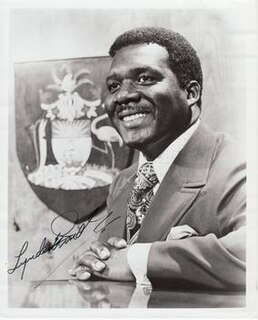
Sir Lynden Oscar Pindling, NH, KCMG, PC, JP was a Bahamian politician who is regarded as the "Father of the Nation" of the Bahamas, having led it to majority rule on 10 January 1967 and to independence on 10 July 1973. He served as the first black premier of the Colony of the Bahama Islands from 1967 to 1969 and as Prime Minister of the Bahamas from 1969 to 1992. He was leader of the Progressive Liberal Party (PLP) from 1956 to 1997 when he resigned from public life under scandal.

Santo Trafficante Jr. was among the most powerful Mafia bosses in the United States. He headed the Trafficante crime family and controlled organized criminal operations in Florida and Cuba, which had previously been consolidated from several rival gangs by his father, Santo Trafficante Sr.
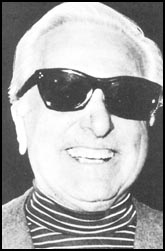
John"Handsome Johnny"Roselli, sometimes spelled Rosselli, was an influential mobster for the Chicago Outfit who helped that organization control Hollywood and the Las Vegas Strip. In the early 1960s, Roselli was recruited by the Central Intelligence Agency (CIA) in a plot to assassinate Cuban leader Fidel Castro.
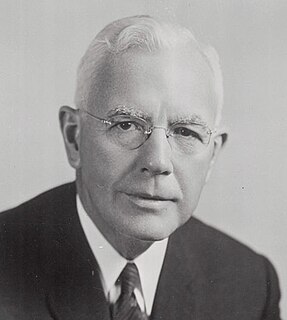
John Alexander McCone was an American businessman and politician who served as Director of Central Intelligence from 1961 to 1965, during the height of the Cold War.

The United States embargo against Cuba prevents American businesses, and businesses organized under U.S. law or majority-owned by American citizens, from conducting trade with Cuban interests. It is the most enduring trade embargo in modern history. The US first imposed an embargo on the sale of arms to Cuba on March 14, 1958, during the Fulgencio Batista regime. Again on October 19, 1960, almost two years after the Cuban Revolution had led to the deposition of the Batista regime, the US placed an embargo on exports to Cuba except for food and medicine after Cuba nationalized the US-owned Cuban oil refineries without compensation. On February 7, 1962, the embargo was extended to include almost all exports. The United Nations General Assembly has passed a resolution every year since 1992 demanding the end of the US economic embargo on Cuba, with the US and Israel being the only nations to consistently vote against the resolutions.

The Genting Group is a company headquartered in the Wisma Genting in Kuala Lumpur, Malaysia. It comprises the holding company Genting Berhad, its listed subsidiaries Genting Malaysia Berhad, Genting Plantations Berhad, Genting Singapore Plc, as well as its wholly owned subsidiary Genting Energy Limited.

John Fitzgerald Kennedy, often referred to by his initials as JFK or by the nickname Jack, was an American politician who served as the 35th president of the United States from 1961 until his assassination near the end of his third year in office. Kennedy was the youngest person to assume the presidency by election. He was also the youngest president at the end of his tenure, and his lifespan was the shortest of any president. Kennedy served at the height of the Cold War, and the majority of his work as president concerned relations with the Soviet Union and Cuba. A Democrat, he represented Massachusetts in both houses of the U.S. Congress prior to his presidency.

Oriental Park Racetrack in Marianao, Havana, Cuba, was a thoroughbred horse-racing facility operated during the winter by the Havana-American Jockey Club of Cuba. Founded in 1915, Oriental Park was the only race track in Cuba in the days before Fidel Castro came to power in 1959.

The Robert F. Kennedy presidential campaign began on March 16, 1968, when Robert Francis Kennedy, a United States Senator from New York, mounted an unlikely challenge to incumbent Democratic United States President Lyndon B. Johnson. Following an upset in the New Hampshire Primary, Johnson announced on March 31 that he would not seek re-election. Kennedy still faced two rival candidates for the Democratic Party's presidential nomination: the leading challenger United States Senator Eugene McCarthy and Vice President Hubert Humphrey. Humphrey had entered the race after Johnson's withdrawal, but Kennedy and McCarthy remained the main challengers to the policies of the Johnson administration. During the spring of 1968, Kennedy campaigned in presidential primary elections throughout the United States. Kennedy's campaign was especially active in Indiana, Nebraska, Oregon, South Dakota, California, and Washington, D.C. Kennedy's campaign ended on June 6, 1968 when he was assassinated at the Ambassador Hotel in Los Angeles, California, following his victory in the California Primary. Had Kennedy been elected, he would have been the first brother of a U.S. President to win the presidency himself.

The following outline is provided as an overview of and topical guide to The Bahamas:

Salvatore Mooney Giancana was an American mobster who was boss of the Chicago Outfit from 1957 to 1966.
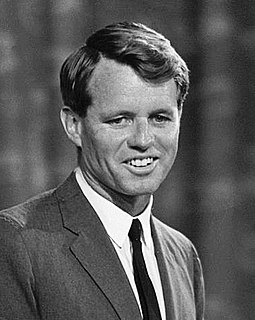
Robert Francis Kennedy, also referred to by his initials RFK or by the nickname Bobby, was an American lawyer and politician who served as the 64th United States Attorney General from January 1961 to September 1964, and as a U.S. Senator from New York from January 1965 until his assassination in June 1968. He was, like his brothers John and Edward, a prominent member of the Democratic Party and has come to be viewed by some historians as an icon of modern American liberalism.

The assassination of John F. Kennedy on November 22, 1963, and the murder of Lee Harvey Oswald by nightclub owner Jack Ruby spawned numerous conspiracy theories. These theories allege the involvement of the CIA, the Mafia, Vice President Lyndon B. Johnson, Cuban Prime Minister Fidel Castro, the KGB, or some combination of these entities. The original FBI investigation and Warren Commission report, as well as an alleged "benign CIA cover-up", have led to the claim that the federal government deliberately covered up crucial information in the aftermath of the assassination. Former Los Angeles District Attorney Vincent Bugliosi estimated that a total of 42 groups, 82 assassins, and 214 people had been accused at one time or another in various conspiracy scenarios.
Coakley Cay in the Exuma Islands of the Bahamas is an 340 acres (140 ha) cay, located west of Great Exuma.
Wallace Groves was a prominent financier, who, after his release from federal prison in 1944, moved to the Bahamas and there founded and operated the free trade zone, resort, and casino development Freeport on Grand Bahama Island. Investigators of U.S. organized crime associate him with the Meyer Lansky syndicate operating offshore casinos from Miami Beach. These ties notwithstanding, he is credited with being a driving force in the development of the modern Bahamian economy.
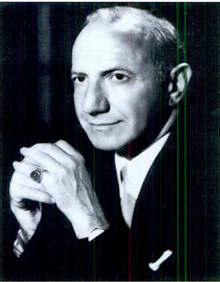
Edward Levinson was an American criminal and gambling operator.
This bibliography of John F. Kennedy is a list of published works about John F. Kennedy, the 35th president of the United States.
References
- ↑ AncientFaces, M J Mclaney (1915 - 1994)
- 1 2 Russo (2010:526)
- 1 2 3 4 Gus Russo (2010), Live by the Sword: The Secret War Against Castro and the Death of JFK , Bancroft Press, p161-2
- ↑ United States Tennis Association, U.S. ADULT & SENIOR NATIONAL CHAMPIONSHIPS Archived 2012-10-21 at the Wayback Machine
- ↑ FBI, 1. October 1965, Mary Ferrell Foundation, He has a silent interest in the Carousel Gambling Casino
- ↑ Time , 1 October 1973, Accusing a Roosevelt
- ↑ William Lambert and Richard Oulahan, Life , 3 February 1967, "The Scandal in the Bahamas"
- ↑ Time, Inc., D/B/A Life v. Michael J. McLaney A/K/A Mike McLaney, 406 F.2d 565 (5th Cir. 1969), It went to the supreme court and he won ,11 February 1969
- ↑ Marcus Stern, San Diego Union-Tribune , 2 October 1994, Hill of plenty: Some Americans living in Haiti look down on slum-dwellers
- ↑ The New York Times , October 12, 1994, MISSION TO HAITI: THE RICH; Business Owners Fear Chaos at the Hands of Mobs When Aristide Returns